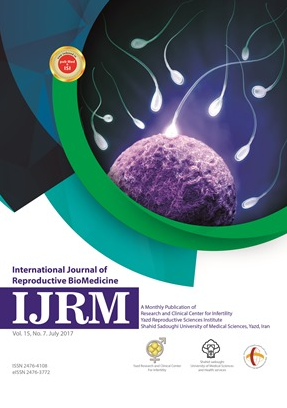
International Journal of Reproductive BioMedicine
ISSN: 2476-3772
The latest discoveries in all areas of reproduction and reproductive technology.
Investigating the mental health status of infertile women
Published date: Jun 10 2019
Journal Title: International Journal of Reproductive BioMedicine
Issue title: International Journal of Reproductive BioMedicine (IJRM): Volume 17, Issue No. 4
Pages: 293–294
Authors:
Abstract:
Letter to Editor
The stressful experience of infertility is associated with a wide range of psychological damage (1), so infertility affects people’s mental health and all aspects of an individual’s life (2). Since women in the family are considered to be the main pillars of the community and they are also more vulnerable to illnesses, therefore consideration of their health is also very important (3). The objective of the current letter is investigating the mental health status of infertile women and its related factors as predictors of mental health in
infertile women. This is a descriptive study conducted on 100 infertile women referred to the infertility treatment centers in Mazandaran province, North of Iran. The General Health Questionnaire was provided to the infertile women. The questionnaire is a self-reporting questionnaire that is used clinically to track those who are prepared for mental illness(4).
Based on the findings, Total Scale of General Health Questionnaire was 33.18 ± 10.27 that was according to the cut-off point of 22, 85% of the infertile women in this study are in the disorder condition. Also, in terms of subscales: physical complaints was 8.65 ± 3.97, anxiety and insomnia was 8.69 ± 5.58, disruption of social function was 12.73 ± 3.34, and depression was 3.10 ± 3.79. The most common disorder was related to
social disorder subscale and the least common subscale was related to the depression
disorder. The subscales of physical symptoms and sleep disturbance and anxiety are
ranked almost at one level, and they are classified between the two subscales that were
already mentioned. Therefore, based on our findings and the level of women’s mental health, there is
a need for a psychologist or midwifery counselor in the infertility treatment centers to improve the mental health of women. In addition, since the mental disease may also affect the outcome of the treatment, attention to the mental health of infertile women is really importance.
References:
[1] Besharat MA, Hosseinzade Bazargani R. Comparison of mental health and sexual problems of fertile
and infertile women. J Psychiatry Clin Psychol 2005; 12: 146–153.
[2] Hamzehgardeshi Z, Yazdani F, Elyasi F, Moosazadeh M, Peyvandi S, Samadaee Gelehkolaee K, et al. The
efficacy of group counselling on perceived stress among infertile women undergoing in vitro fertilization
treatment: An RCT. Int J Reprod BioMed 2019; 17: 57–66.
[3] Jamilian M, Rafiei M, Jamilian HR, Esmkhani F. [The comparison of general health between fertile and
infertile women of Arak City in 2010.] Arak Med Uni J 2011; 14: 27–35. (in Persian)
[4] Latifnejad Roudsari R, Rasolzadeh Bidgoly M, Mousavifar N, Modarres Gharavi M. The effect of
collaorative counseling on perceived infertility-related stress in infertile women undergoing IVF. Women
Obstet Infertil Iran 2011; 14: 22–31.